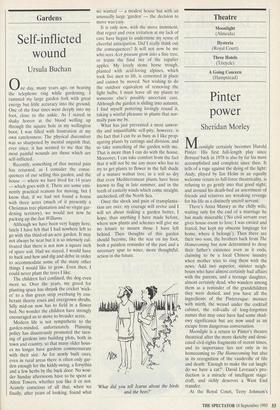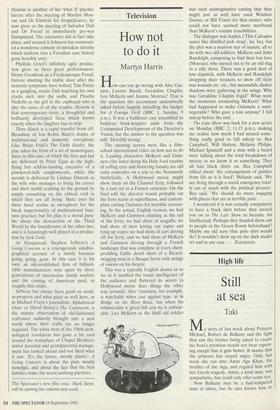Theatre
Moonlight (Almeida) Hysteria (Royal Court) Three Hotels (Tricycle)
A Going Concern
(Hampstead)
Pinter power
Sheridan Morley
Moonlight certainly becomes Harold Pinter. His first full-length play since Betrayal back in 1978 is also by far his most accomplished and complete since then. It tells of a rage against the dying of the light: Andy, played by Ian Holm in an equally welcome return to full-force theatricality, is refusing to go gently into that good night, and around his death-bed an assortment of friends and relatives are wreaking revenge for his life as a distinctly uncivil servant.
There's Anna Massey as the chilly wife, waiting only for the end of a marriage he has made miserable (`No civil servant ever gives house-room to love: I was envied and feared, but kept my obscene language for home, where it belongs'). Then there are their two sons, the brothers back from The Homecoming but now determined to deny their father's existence even as it ends, claiming to be a local Chinese laundry when mother tries to ring them with the news. Add two superior, sinister neigh- bours who have almost certainly had affairs with the parents, and a teenage daughter, almost certainly dead, who wanders among them as a reminder of the grandchildren they were denied, and you have all the ingredients of the Pinteresque: menace with mirth, the weasel under the cocktail cabinet, the roll-calls of long-forgotten names that may once have had some shad- owy significance but are now used as an escape from dangerous conversation.
Moonlight is a return to Pinter's theatre theatrical after the more sketchy and dessi- cated civil-rights fragments of recent times, and its importance lies not only in its homecoming to The Homecoming but also in its recognition of the vaudeville of life and death: 'Enough to make the cat laugh: do we have a cat?'. David Leveaux's pro- duction is a miracle of intelligent stage- craft, and richly deserves a West End transfer.
At the Royal Court, Terry Johnson's Hysteria is another of his 'what if psycho- farces: after the meeting of Marilyn Mon- roe and Dr Einstein for Insignificance, he now gives us the meeting of Salvador Dali and Dr Freud in immediately pre-war Hampstead. The encounter did in fact take place, and around it Johnson has construct- ed a wondrous comedy of mistaken identity which darkens into a Freudian case history gone horribly awry.
Phyllida Lloyd's infinitely agile produc- tion gives us three great performances: Henry Goodman as a Feydeauesque Freud, forever shutting the stable door after the neurotic symptoms have bolted; Tim Potter as a gangling, manic Dali watching his own clocks melt into the walls, and Phoebe Nicholls as the girl in the cupboard who is also the cause of all the trouble. Hysteria is that contemporary rarity, a thoughtful and brilliantly developed farce which knows exactly when the laughter has to stop.
Three Hotels is a rapid transfer from off- Broadway of Jon Robin Baitz's drama of multinational and domestic corruption. Like Brian Friel's The Faith Healer, the play takes the form of a set of monologues, three in this case, of which the first and last are delivered by Peter Egan as the high- flying but seldom-landing executive of a powdered-milk conglomerate, while the second is delivered by Lindsay Duncan as the wife who manages to bring his career and their world crashing to the ground by simply remarking on the ethical void in which they are all living. Baitz uses his three hotel rooms as metaphors for the bleak impersonality of multinational busi- ness practice; but his play is a moral para- ble about the destruction of the Third World by the boardrooms of the other two, and it is hauntingly well played in a produc- tion by Jack Gold.
At Hampstead, Stephen Jeffreys's A Going Concern is a courageously autobio- graphical account of a family business going, going, gone. In this case it is his own: an old-established firm of billiard- table manufacturers torn apart by three generations of internecine family warfare and the coming of American pool, in roughly that order.
Jeffreys has always been good on work- in-progress and what plays so well here, as in Michael Frayn's journalistic Alphabetical Order or David Storey's The Contractor, is the minute observation of old-fashioned craftsmen suddenly brought into a new world where their crafts are no longer required. The white heat of the 1960s tech- nological revolution has gone a bit cool around the workplace of Chapel Brothers: senior parental and grandparental manage- ment has looked ahead and not liked what it saw: 'It's the future, mostly plastic'. A Going Concern is about the past, mostly nostalgic, and about the fact that the best families make the worst working partners.
The Spectator's new film critic, Mark Steyn, will be starting his column next week.



































































 Previous page
Previous page